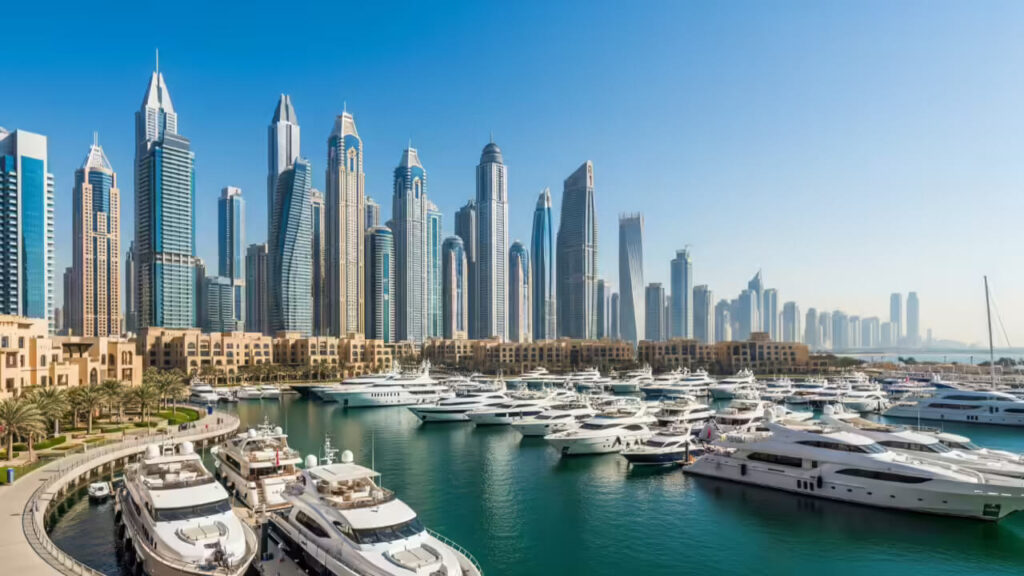With strong rental prices and ongoing demand driving a market that doesn’t appear to be slowing down, Dubai’s real estate industry continues to withstand global challenges. The CEO of fête Properties, Firas Al Msaddi, claims that the emirate’s real estate market is about to enter a critical stage that highlights both opportunities and challenges for developers.
Dubai had a 20% increase in off-plan transactions and a 10% increase in resale transactions during the first nine months of 2025, going from 48,000 to 53,000 units. In the meantime, there were about 120,000 new residential launches, which is 7.5% fewer than the 130,000 from the previous year. “Supply has tightened while demand continues to grow,” Al Msaddi noted, adding that this imbalance is fueling price resilience across many segments.
Rising land prices are a major contributing factor to the supply issue. “Since 2020, land prices in Dubai have increased by 200–300 percent,” he stated. This increase has created a market where established businesses with high brand equity have a clear advantage, making it more difficult for new entrants to get plots and produce lucrative projects.
The supply squeeze is largely attributed to soaring land costs. “Land prices in Dubai have jumped 200–300 per cent since 2020,” he said. This increase has created a market where established businesses with high brand equity have a clear advantage, making it more difficult for new entrants to get plots and produce lucrative projects.
District-by-district performance varies, but overall signs are still positive. Oversupply may cause price adjustments in places like Jumeirah Village, where 27,000 new units are entering the market. On the other hand, Jebel Ali provides substantial upside potential, with 29,000 units planned and infrastructure still in its early phases.
“Infrastructure development will be the key driver,” Al Msaddi explained. “Locations like Jebel Ali are poised for growth as connectivity and amenities improve.”
Rental prices, for now, remain firm across most neighborhoods, reinforcing Dubai’s appeal for both investors and residents. “We’re not seeing signs of a broad correction,” he said, though selective adjustments are likely in saturated pockets.
Abu Dhabi emerges as a strategic alternative
The sharp escalation in Dubai land values is prompting developers to look beyond the emirate. “Abu Dhabi offers a historic opportunity,” Al Msaddi emphasised.
While plots in Dubai’s Al Wasl region have surged from Dh500 per sq. ft. in 2021 to Dh3,500 today, Abu Dhabi’s land remains fairly reasonable. This price differential is enticing developers keen to obtain desirable properties at logical pricing. “Brand equity now plays a major role,” Al Msaddi said. “An Emaar project sells differently than a first-time developer’s offering.”
Newcomers such as Binghatti have also made news, expanding swiftly over the previous few years. Yet, as financing rates and land prices grow, the market is expected to favor seasoned firms with proven track records.
Despite high-profile moves into markets like London, Dubai remains the crown jewel for developers. “No global market compares to Dubai’s returns today,” Al Msaddi asserted. Overseas ventures are largely strategic, aimed at diversification rather than chasing higher margins.
Underlying this momentum is a profound lifestyle shift. “People aren’t just investing in Dubai — they’re choosing to live here,” he said. The city’s evolution from a transient hub to a long-term home for many expatriates is reinforcing demand and sustaining growth.
As 2025 draws to a close, Dubai’s real estate market sits at an inflection point – buoyant yet selective, competitive yet rewarding. For developers and investors alike, the message is clear: location, brand strength, and timing will define success in the region’s most dynamic property sector.
